
Politics of Japan are conducted in a framework of a dominant-party bicameral parliamentary constitutional monarchy, in which the Emperor is the head of state and the Prime Minister is the head of government and the head of the Cabinet, which directs the executive branch.

Junichiro Koizumi is a Japanese retired politician who was Prime Minister of Japan and President of the Liberal Democratic Party (LDP) from 2001 to 2006. He retired from politics in 2009. He is the sixth-longest serving Prime Minister in Japanese history.

The Liberal Democratic Party, frequently abbreviated to LDP or Jimintō (自民党), is a major conservative and Japanese nationalist political party in Japan.

Eisaku Satō was a Japanese politician who served as prime minister of Japan from 1964 to 1972. He is the third longest-serving prime minister, and ranks second in longest uninterrupted service as prime minister.

The House of Representatives is the lower house of the National Diet of Japan. The House of Councillors is the upper house. The composition of the House is established by Article 41 and Article 42 of the Constitution of Japan. The House of Representatives has 465 members, elected for a four-year term. Of these, 176 members are elected from 11 multi-member constituencies by a party-list system of proportional representation, and 289 are elected from single-member constituencies.
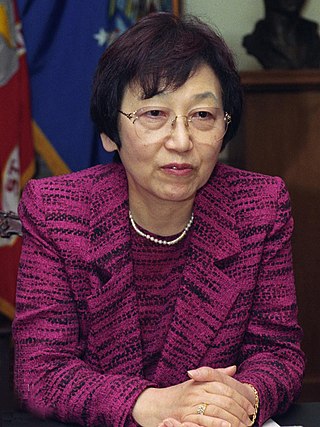
Yoriko Kawaguchi is a Japanese politician. Born in Tokyo, she holds a BA in international relations from the University of Tokyo, and an MPhil in economics from Yale University, where she became a member of President's Council on International Activities. Currently, she is a professor at the Meiji Institute for Global Affairs in Tokyo.
Neoconservatism in Japan, also known as the neo-defense school, is a term used by Asian media only recently to refer to a hawkish new generation of Japanese conservatives. They are distinguished from older Japanese conservatives in that they take a more "active" view of the Japanese Self-Defense Forces and are known for making what would be considered in the Western world politically incorrect statements. Despite this, or perhaps because of it, they enjoy fair popularity across the nation, especially with the middle-aged population. The term is used in China, North Korea, and South Korea, as well as in Japan, to describe them.
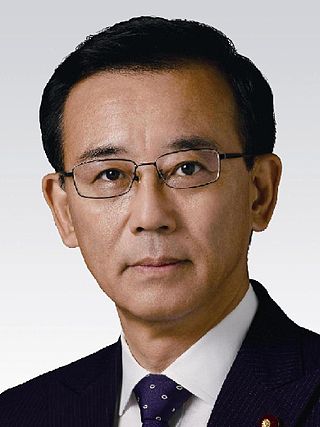
Sadakazu Tanigaki is a Japanese politician who served as a member of the House of Representatives from 1983 to 2016, as Minister of Finance from 2003 to 2006, as President of the Liberal Democratic Party and Leader of the Opposition from 2009 to 2012, as Minister of Justice from 2012 to 2014, and as LDP Secretary-General from 2014 to 2016. He was only the second LDP leader who was not simultaneously Prime Minister of Japan. He retired from politics following a spinal cord injury in 2016 that saw him using a wheelchair.

Tarō Asō is a Japanese politician serving as the Vice President of the Liberal Democratic Party (LDP) since 2021. Asō previously served as Prime Minister of Japan from 2008 to 2009 and as Deputy Prime Minister of Japan and Minister of Finance from 2012 to 2021. He was the longest-serving Deputy Prime Minister and Minister of Finance in Japanese history, having previously served as Minister for Foreign Affairs from 2005 to 2007 and as Minister for Internal Affairs and Communications from 2003 to 2005. He leads the Shikōkai faction within the LDP.

Shinzo Abe was a Japanese politician and statesman who served as Prime Minister of Japan and President of the Liberal Democratic Party (LDP) from 2006 to 2007 and again from 2012 to 2020. He was the longest-serving prime minister in Japanese history, serving for almost nine years in total. Abe also served as Chief Cabinet Secretary from 2005 to 2006 under Junichiro Koizumi and was briefly the opposition leader in 2012.

Sanae Takaichi is a Japanese politician who has served as the Minister of State for Economic Security since August 2022. A member of the Liberal Democratic Party, she has served in the House of Representatives since 2005, and had also served in several ministerial posts under Prime Minister Shinzo Abe. In 2021, she was a candidate in the Liberal Democratic Party leadership election, but was ultimately eliminated in a run-off, placing third.
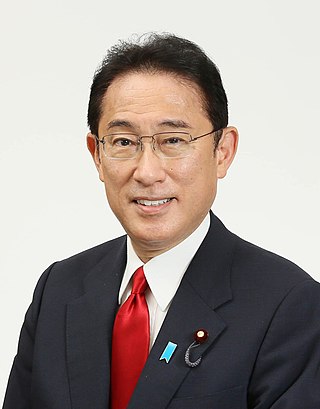
Fumio Kishida is a Japanese politician who has served as Prime Minister of Japan and President of the Liberal Democratic Party (LDP) since 2021. A member of the House of Representatives, he previously served as Minister for Foreign Affairs from 2012 to 2017 and as acting Minister of Defense in 2017. From 2017 to 2020, he also chaired the LDP Policy Research Council.

Toshimitsu Motegi is a Japanese politician who currently serves as the Secretary-General of the Liberal Democratic Party. He has previously served as Minister for Foreign Affairs from 2019 to 2021, and as Minister of Economy, Trade and Industry from 2012 to 2014. He is serving in the House of Representatives as a member of the Liberal Democratic Party. He leads the Heisei Kenkyūkai faction within the LDP.
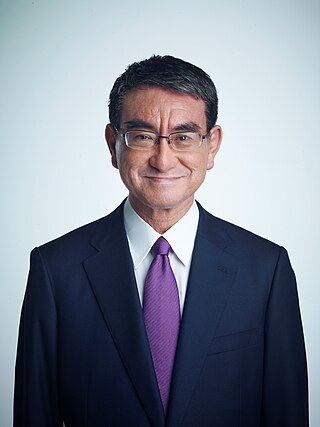
Taro Kono is a Japanese politician serving as the Minister for Digital Transformation since August 2022. A member of the Liberal Democratic Party, he previously served as Minister for Administrative Reform and Regulatory Reform from 2015 to 2016 and from 2020 to 2021, and was the Minister for Foreign Affairs and Minister of Defense under Prime Minister Shinzo Abe. He is also a member of the House of Representatives representing Kanagawa's 15th district since 1996.

Nobuo Kishi is a Japanese politician. He sat in the House of Representatives from 2012 to 2023 representing Yamaguchi’s 2nd District as a member of the Liberal Democratic Party. From September 2020 to August 2022 he served as the Minister of Defense. He is the younger brother of former Japanese prime minister Shinzo Abe.

Factions are an accepted part of the Liberal Democratic Party (LDP), the ruling party of Japan, which began with eight formal factions when it was first formed by merger in 1955. A political faction may be defined as a sub-group within a larger organization. While factions characterize other political parties in Pacific Asia, Japanese factionalism is distinguished by its stability and institutionalization. Although factions reconstitute themselves from time to time, the habatsu active today can be traced back to their 1955 roots, a testament to the stability and institutionalized nature of Liberal Democratic Party factions.

General elections were held in Japan on 16 December 2012. Voters gave the Liberal Democratic Party a landslide victory, ejecting the Democratic Party from power after three years. It was the fourth worst defeat suffered by a ruling party in Japanese history.

General elections were held in Japan on 22 October 2017. Voting took place in all Representatives constituencies of Japan – 289 single-member districts and eleven proportional blocks – in order to appoint all 465 members of the House of Representatives, the lower house of the then 707-member bicameral National Diet of Japan. Incumbent Prime Minister Shinzō Abe's governing coalition of the Liberal Democratic Party (LDP) and the Komeito party retained their seats in signs of what was perceived as weak opposition. The PM won his fourth term in office and held on to the two-thirds supermajority in order to implement policies on revising the war-renouncing Article 9 of the Japanese Constitution.
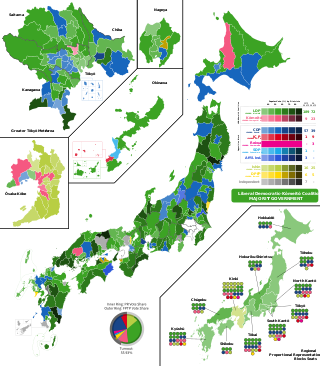
General elections were held in Japan on 31 October 2021, as required by the constitution. Voting took place in all constituencies in order to elect members to the House of Representatives, the lower house of the National Diet. As the constitution requires the cabinet to resign in the first Diet session after a general election, the elections will also lead to a new election for Prime Minister in the Diet, and the appointment of a new cabinet, although ministers may be re-appointed. The election was the first general election of the Reiwa era.
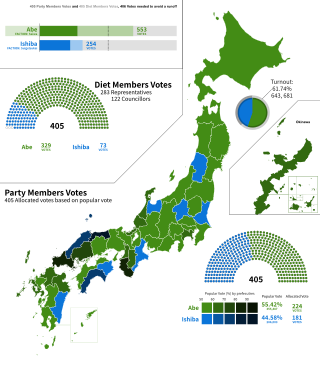
A leadership election was held on 20 September 2018 to elect the next president of the Liberal Democratic Party of Japan for a new 3-year term. Incumbent president Shinzo Abe was running for re-election after a rule change in 2017 that allowed him to run for a third term.




















